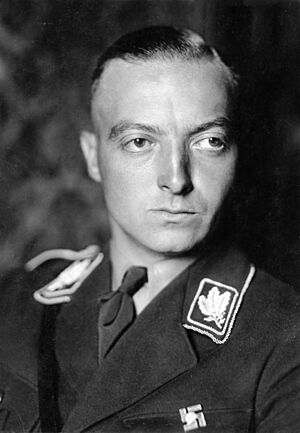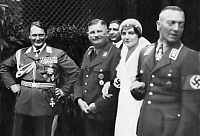Karl Ernst facts for kids
Quick facts for kids
Karl Ernst
|
|
|---|---|

Ernst in 1933
|
|
| Führer, SA-Gruppe Berlin-Brandenburg | |
| In office 15 March 1933 – 30 June 1934 |
|
| Personal details | |
| Born | 1 September 1904 Berlin, Kingdom of Prussia, German Empire |
| Died | 30 June 1934 (aged 29) Berlin, Free State of Prussia, Nazi Germany |
| Cause of death | Execution by firing squad |
| Occupation | German Nazi paramilitary officer |
Karl Ernst (born September 1, 1904 – died June 30, 1934) was an important leader in the Sturmabteilung (SA), a large group linked to the Nazi Party. From March 1933, he was the SA Commander in Berlin. Before joining the Nazi Party, he worked in hotels. He was later killed during an event known as the Night of the Long Knives.
Early Life
Karl Ernst was born in Berlin in 1904. His father was a soldier. Karl went to school in Berlin and then learned how to be an export merchant between 1918 and 1921.
When he was young, he joined youth groups and military-like organizations. In 1918, he became part of a right-wing youth group. He also joined a group called the Freikorps “Eskadron Grunewald”. From 1920 to 1923, he was a member of the Viking League. During these years, he worked as a clerk in Berlin and Mainz. In 1923, he joined the Sturmabteilung (SA), which was a powerful group that supported the Nazi Party.
After a failed attempt by the Nazi Party to take power in 1923 (called the Hitler Putsch), the party was banned for a while. During this time, Ernst joined other groups that were against democracy. He worked in different jobs, like being a clerk, a buyer, and a bellhop in various cities.
SA Career
From 1927 to 1931, Karl Ernst worked for the main SA leadership in Munich. In April 1931, he became an assistant leader for the SA in Berlin. He then joined the Nazi Party. As an assistant, Ernst helped the Berlin SA commander, Wolf-Heinrich Graf von Helldorff, with organizing events. For his part in public disturbances in September 1931, Ernst faced charges and was briefly imprisoned.
Ernst quickly moved up in the SA. In December 1931, he became an assistant leader for the SA-Gruppe Berlin-Brandenburg. From July 1932 to March 1933, he led a smaller SA group in East Berlin. On March 1, 1933, he was promoted to a high rank, SA-Gruppenführer. On March 15, he took over from Helldorff as the leader of the SA-Gruppe Berlin–Brandenburg. This meant he was in charge of all SA members in Berlin and the surrounding area. He also controlled the SA police, who were involved in stopping people who disagreed with the government.
Ernst was also elected as a Nazi representative to the Reichstag, which was like the German parliament. He was elected several times between 1932 and 1933. In August 1933, he was also appointed to the Prussian State Council by Hermann Göring, a leading Nazi official.
Reichstag Fire

Some people have suggested that Karl Ernst and a small group of SA members were involved in setting the Reichstag building on fire on the night of February 27, 1933. The Reichstag building was where the German parliament met. There were some clues that pointed to this idea. However, most historians agree that a man named Marinus van der Lubbe was the one who actually set the fire.
Night of the Long Knives
In June 1934, Karl Ernst had just gotten married and was in Bremen, planning to go on his honeymoon to Tenerife. At this time, the leader of the SA, Ernst Röhm, was talking about a "second revolution." This worried other powerful people in the German government and military. They were afraid that the SA was becoming too strong and wanted to reduce its power.
Because of these fears, Adolf Hitler decided to remove many SA leaders from power. This event is known as the Night of the Long Knives, and it lasted from June 30 to July 2, 1934.
Karl Ernst was arrested in Bremerhaven while he was about to board a ship for his honeymoon. He was with his new wife and a friend. He was then taken to Berlin and shot by a firing squad on the evening of June 30. He was one of many people killed during this time.
See also
- SA-Gruppe Berlin-Brandenburg
- Information about Karl Ernst in the Reichstag database
 | Aaron Henry |
 | T. R. M. Howard |
 | Jesse Jackson |


